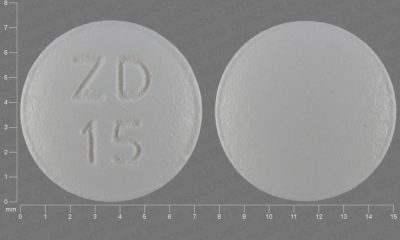Health
6 Benefits of Butterbur herb and side effects

6 Benefits of Butterbur Herb and side effects.
Seasonal allergies are often accompanied by a flurry of unpleasant symptoms. Sneezing, sniffling and itchy eyes are just some of the annoying side effects that come with the season.
If you’re like most, you’ve probably desperately reached for antihistamines to find quick relief from your allergies only to experience additional symptoms like drowsiness, dry mouth, or nausea.
Fortunately, there are natural allergy remedies, like the herb butterbur, that can help prevent symptoms without the unpleasant side effects.
Butterbur herb is good for more than just allergy season. It can be used year-round to relieve inflammation, prevent migraines, reduce asthma symptoms, and even protect the brain and heart from damage.
In the past, it was also used as a traditional treatment to help heal wounds, reduce symptoms of urinary tract infection, and fight fevers.
Available in a convenient capsule form, adding butterbur herb to your medicine cabinet can have a huge impact on your health and may even reduce your need for other medications.
Benefits of Butterbur Herb
1.- treats seasonal allergies
Allergic rhinitis, also known as hay fever or seasonal allergies, is an allergic response that produces symptoms such as sneezing and itchy eyes.
Although traditional treatment includes medications such as antihistamines, steroids, and decongestants, the herb butterbur can be an effective natural alternative to help reduce symptoms.
In one study, butterbur extract was shown to be significantly more effective in treating hay fever than placebo in a randomized, double-blind, placebo-controlled, parallel-group comparison.
In another study, the effects of butterbur were compared to cetirizine, also known as Zyrtec, a drug used to treat seasonal allergies. Not only was butterbur as effective as cetirizine in improving symptoms, but it also produced fewer negative side effects, such as drowsiness and fatigue.
For those who suffer from seasonal allergies, butterbur can be a great option to help lessen symptoms and avoid the adverse side effects that can occur with traditional medications.
2.- Relieves migraines
If you’ve ever suffered from migraines, you’re probably all too familiar with the long list of migraine symptoms that come with them.
Throbbing pain, sensitivity to light and sound, dizziness, nausea, and vomiting are all common side effects when you have a migraine.
Fortunately, many natural remedies can help lessen symptoms. Butterbur herb extract has been shown to help naturally treat migraines.
In one study, the benefits of butterbur cut migraine frequency by 48 percent over a four-month treatment period. Another trial found similar results, showing that the herb decreased the number of migraines by 47 percent and was significantly more effective than a placebo.
Additional research focused only on children and adolescents who took butterbur and found that migraine frequency was reduced by 63 percent, and 91 percent still felt improvements four months after treatment.
If you suffer from frequent migraines, butterbur can be a great natural remedy to have on hand. You may also want to consider other natural remedies, such as feverfew, which have been shown to provide migraine relief as well.
3.- Reduces asthma symptoms
Asthma is a common problem throughout the world, affecting approximately 300 million people and accounting for 250,000 premature deaths each year.
Some evidence shows that the benefits of butterbur herb could be used in combination with traditional treatment to help improve asthma symptoms.
One study measured the effects of butterbur in 80 participants with asthma for four months. Not only did the severity, duration, and number of asthma attacks decrease, but symptoms also improved, and 40 percent of participants reduced their use of asthma medications.
An animal study also showed that butterbur has potent anti-inflammatory properties that can help treat asthma.
Using butterbur, alone or with other asthma treatments, might help reduce asthma symptoms and severity while reducing the number of asthma attacks.
4.- Protects the brain
Interestingly, there is some evidence showing that butterbur might help keep your brain healthy and protect against oxidative damage.
Oxidative damage is caused by the buildup of damaging free radicals, compounds that form as a result of factors such as stress, pollution, and a poor diet. If antioxidants don’t neutralize free radicals, they can cause cell damage and even lead to chronic disease.
An animal study showed that the herb butterbur has a protective effect on the brain. It was able to prevent damage to the brain even after a neurotoxin was administered.
The herb butterbur also contains a plant compound called kaempferol, which is also found in foods such as broccoli, Brussels sprouts, spinach, apples, and green tea. Kaempferol boasts a long list of health benefits and has even been shown to prevent oxidative damage to the brain.
Compounds found in butterbur may help keep your brain healthy and prevent degenerative brain disorders such as dementia and Alzheimer’s disease.
5.- Promotes heart health
The herb butterbur is full of health-promoting compounds and antioxidants that can help improve your heart health and reduce certain risk factors for heart disease.
In an animal study, butterbur supplementation was shown to decrease total cholesterol, bad LDL cholesterol, and oxidative stress in mice. Another animal study also found that it improved cholesterol concentrations and even reduced body weight and fat accumulation.
The kaempferol found in this herb may also benefit heart health. Several studies have shown that it can protect against heart damage caused by heart attacks.
6.- Reduces inflammation
Although inflammation is a normal response of the immune system, more and more emerging research shows that chronic inflammation may be at the root of many diseases. Inflammation is thought to contribute to diseases like obesity, cancer, diabetes, and heart disease.
The herb butterbur contains powerful anti-inflammatory properties and has been shown to prevent the buildup of inflammatory cells in the body. Kaempferol, one of the components found in butterbur, also contains anti-inflammatory properties.
An animal study showed that kaempferol reduced levels of inflammatory markers and reduced oxidative stress in mice.
According to these studies, pairing butterbur with a balanced diet and healthy lifestyle may help decrease inflammation and prevent chronic disease.
How To Use Butterbur Herb
The herb butterbur is most commonly found as a supplement in capsule form and is widely available at most natural health stores, drug stores, and online retailers.
It is also found in some natural medicines, such as Petadolex. Petadolex is a medicine containing butterbur that is used to promote blood flow and prevent migraines.
Most studies show that butterbur is most effective when given in doses of 50 to 75 milligrams twice daily. You may want to start with a smaller amount and gradually increase your intake to assess tolerance.
Be aware that some butterbur-containing products may also contain pyrrolizidine alkaloids (PAs), a type of chemical that can cause liver damage and other adverse side effects. If you have liver problems, avoid raw butterbur and look for butterbur-free products to avoid this harmful chemical.
Also, be sure to look for a trusted brand with minimal ingredients to ensure you’re getting the best quality possible.
The butterbur plant in dried form or extract can also be used to make an allergy-fighting tea.
Butterbur Herb Side Effects and Precautions
Although generally safe and well-tolerated, some people may want to avoid butterbur.
Some people may be allergic to this herb. Butterfly allergies are more common in those who are also sensitive to other plants in the same family, such as ragweed, daisies, marigolds, and chrysanthemums. If you experience symptoms such as hives, itching, or swelling of the throat, you should stop using immediately and talk to your doctor.
If you are pregnant or nursing, the use of butterbur is not recommended as its effects have not yet been studied. Also, although it is safe and effective for children, it should only be given to children under the supervision of a healthcare professional.
You should also make sure to only use products labeled certified PA-free to avoid liver damage and other negative effects. Consuming raw, unprocessed butterbur is not recommended for those with liver problems in particular, as these harmful chemicals have not been removed.
Common side effects of butterbur include headache, diarrhea, fatigue, belching, and itchy eyes.
As always, if you experience negative side effects, you may want to lower the dosage or discontinue use and consult with your doctor.
Final Thoughts on Butterbur Herb Benefits
The butterbur herb has a long history of being used as a medicinal herb, treating everything from the plague to fevers and wounds.
Several recent studies have shown that it can effectively treat migraines, reduce seasonal allergy symptoms, protect the heart and brain, relieve inflammation, and lessen the severity of asthma.
It’s easy to add butterbur into your daily routine whether you’re using a supplement once or twice a day or brewing an occasional cup of butterbur tea.
Use alone or with other natural remedies in conjunction with a healthy lifestyle to help improve certain conditions and move toward better health.
Health
7 Benefits of jujube seeds and side effects

Table of Contents
Health
Benefits of coconut water in pregnancy

Discover the benefits of coconut water in pregnancy.
Coconut water is a clear, sweet, energizing isotonic drink that helps your body replenish lost fluids. Also known as Nariyal Pani and Elaneer in India, it is known for its versatility and countless nutritional benefits.
IS IT SAFE TO CONSUME COCONUT WATER DURING PREGNANCY?
Yes, it is safe to drink coconut water, but in moderation, as it contains natural vitamins and minerals.
Having coconut water in the first trimester helps curb dehydration resulting from morning sickness. It’s also good for heartburn and constipation, common symptoms of pregnancy.
You can drink coconut water at any time, but the best time is early in the morning. It is healthier, as the electrolytes and nutrients can be easily absorbed when the stomach is empty.
The nutritional benefits present in a cup of coconut water include:
•Calories 46
•Sodium 252mg
•600mg potassium
•Carbs 8.9 grams
•Dietary fiber 2.6 grams
•Sugars 6.26 grams
•Calcium 6%
Benefits of coconut water in pregnancy
You can reap its benefits only when you consume fresh water, as it begins to ferment when left open and exposed to air.
1. NATURAL DIURETIC:
During pregnancy, uric acid levels should be normal in your body system. Coconut water is a diuretic and increases the need to urinate due to the presence of potassium, magnesium, and minerals.
They help eliminate toxins and cleanse the urinary tract. Thus, it improves kidney function and prevents kidney stones and infections. It also prevents urinary tract infections, which reduces the chances of preterm labor.
2. OFFERS ESSENTIAL ELECTROLYTES:
The need for electrolytes increases during pregnancy because conditions like morning sickness, nausea, and diarrhea dehydrate the body. Coconut water supplies all five essential electrolytes: minerals, sodium, calcium, potassium, and phosphorus, which calm the body and provide energy.
These electrolytes transmit electrical charges in your body and aid in muscle function. They also help maintain your body’s pH levels and control blood pressure levels. It is known to have cooling properties, which prevent conditions such as bilious fever and vomiting.
3. RELIEVES HEARTBURN AND CONSTIPATION:
Hormonal changes during pregnancy lead to various problems like heartburn, constipation, and indigestion. The rich content of dietary fiber in coconut water strengthens the digestive system, improves digestion, regulates pH levels, and prevents constipation.
Ayurveda considers young coconut water to be an excellent laxative. Improves metabolism and detoxifies the body. Coconut water is a natural acid neutralizer and thus prevents heartburn.
4. TREAT INFECTIONS:
Coconut water is rich in vitamins, essential minerals, and antioxidants, which boost your immune levels, providing resistance to infections. It contains lauric acid, a medium-chain fatty acid responsible for the production of a powerful antiviral monolaurin, Michelle-Lee Young writes in the book “Two Trees and Twelve Fruits That Will Change Your Life Forever.” Lauric is a disease-fighting acid that kills harmful bacteria and infections like the flu, and HIV, and retains good bacteria.
5. IMPROVES HEART HEALTH:
Low electrolyte level increases blood pressure. Drinking coconut water improves levels of potassium, magnesium, and lauric acid, which help regulate blood pressure. Improves good cholesterol and fights bad cholesterol.
The vitamins, essential proteins, and electrolytes in coconut water control sugar levels, and blood pressure levels, and improve circulation. A glass of coconut water every day is particularly helpful in the last trimester when there is increasing stress from labor that can increase your blood pressure.
6. MAINTAINS A HEALTHY WEIGHT:
Coconut water is fat-free and low in calories. As pregnancy adds extra weight to your body, coconut water prevents fat accumulation by removing bad cholesterol. It is an excellent replacement for sugary drinks and helps both the mother and the growing fetus to be healthy and fit.
7. NATURAL DRINK:
Coconut water is a tasty natural drink. It has no artificial flavors or harmful components. It is safe for you and your growing fetus as none of its components affect your health.
8. ENERGIZE AFTER TRAINING:
Coconut water is a natural isotonic drink, which helps you gain energy when suffering from dehydration, fatigue, and exhaustion. It is a great revitalizer
. If you exercise regularly to stay fit and strengthen your pelvic muscles, you can opt for coconut water as an energy drink. Hydration also improves skin elasticity, limiting the stretch marks that develop during pregnancy.
9. LOW SUGAR CONTENT:
Excessive sugar intake can lead to an increase in overall blood sugar levels. Coconut water has less sugar than other sports and energy drinks. You won’t gain pregnancy weight, and a diet low in simple sugars will reduce your risk of getting gestational diabetes.
10. ACCELERATES THE GROWTH OF THE FETUS:
Coconut water offers all the nutrients to the mother, essential to maintain and improve her health. Thus, it improves the health, growth, and proper nutrition of the unborn baby.
11. IMPROVES AMNIOTIC FLUID LEVELS:
Drinking coconut water improves the overall health and environment of your growing fetus. Coconut water taken especially in the third trimester increases amniotic fluid levels and improves blood volume and circulation.
ARE THERE ANY SIDE EFFECTS OF COCONUT WATER DURING PREGNANCY?
There is no evidence that coconut water has adverse effects on pregnancy. Like any other fruit or vegetable juice, it also appears to be safe. But there are two things to keep in mind:
•Coconut milk contains sodium, which may not be the right choice for pregnant women with preeclampsia.
•Ripe coconut water can cause constipation.
HOW MUCH COCONUT WATER CAN A PREGNANT WOMAN HAVE?
Moderation is always the key when it comes to eating a healthy diet. You can drink up to a glass of coconut water a day.
Consume the water soon after opening, as a fresh one will contain rich nutrients. Use a clean straw or pour it into a glass and drink.
It is always good to prefer natural coconut water to canned or bottled.
Do not consume coconut water if you react or do not like its taste.
HOW TO SELECT THE CORRECT COCONUT?
To enjoy the various benefits of coconut water, you need to know how to select them properly. These tips can help you buy fresh and tender coconut.
A fresh coconut will be light and sweet and will not contain coconut meat, the white, meaty, tender substance. A ripe or stale one will taste sour.
Selection: Choose medium-sized, clean, green walnuts, as they contain large amounts of water. Don’t choose coconuts that have hard brown shells and gray patches as they indicate ripe nuts.
Water: Shake the coconut vigorously near your ear to check for water. Select the ones that make a good splashing sound. A fresh coconut will contain almost a cup of water.
If you want to store coconuts at home, keep them in a cool place.
BENEFITS OF COCONUT MEAT DURING PREGNANCY:
1. GENERATION OF BREAST MILK:
Regular consumption of coconut meat during pregnancy improves the supply of breast milk after childbirth. Your baby will receive nutritious and rich breast milk. Also, coconut oil helps in the generation of breast milk.
It is also good during the lactation phase as it contains lauric and capric acids. These acids have antiviral, antibacterial, and parasiticidal effects, which protect the baby from diseases.
2. IMPROVES BLOOD CIRCULATION:
Blood volume doubles during pregnancy, causing swelling of the feet and legs. Poor blood circulation aggravates the condition. Coconut consumption improves blood circulation and prevents swelling and pain in the legs.
3. HELPS DIGESTION:
Consuming coconut meat and water prevents constipation as tender coconut meat acts as an excellent laxative. It is one of the best benefits of consuming a coconut in any form during pregnancy.
4. BETTER SLEEP:
Having coconut in combination with poppy seeds and ghee will improve your sleep cycle.
5. INCREASES METABOLISM:
When the coconut is mixed with spices, it helps boost metabolic activities in pregnant women.
COCONUT MILK DURING PREGNANCY:
Coconut milk is a thick, milky liquid obtained by grinding grated coconut meat. It is also an essential ingredient in many foods, especially Southeast Asian dishes.
Coconut can be consumed in any form due to its amazing health benefits. Coconut milk helps increase body fuel. It is completely safe to drink unless you are allergic to it.
BENEFITS OF COCONUT MILK DURING PREGNANCY:
1. ENHANCE IMMUNITY:
Coconut milk contains lauric acid, which is an antibacterial and antiviral fat, useful for pregnant women. This type of fat helps improve the immune system, according to the book “Coconut Oil and the Immune System” by Sherri Neal. The long-chain fatty acids straighten the blood vessels and reduce any blockages in the heart, thus improving the condition of the heart as well.
2. OTHER BENEFITS INCLUDE:
•It contains good amounts of iron, which can treat anemia.
•Improves digestive problems.
•It offers relaxation to the muscles and the nervous system.
•Controls blood sugar levels and blood pressure
•Relieves joint pain and scratches
•Makes your body fit and helps you lose weight
HOW TO PREPARE FRESH COCONUT MILK?
It is advisable to make coconut milk at home instead of opting for a packaged one.
Grate a whole coconut and add a cup and a half of hot water.
Let the mixture cool to room temperature.
Once the mixture cools down, strain to get the milk.
Coconut milk taken directly from fresh coconuts will contain approximately 450 calories and 50 g of fat. A cup of coconut milk (approximately 240 g) has the following nutritional values:
•Calories 550
•Fats 50.2gm (all types of fats)
•Cholesterol 0
•Sodium 40gm
•Carbohydrates 14gm (in 250gm of milk)
•Proteins 6gm
•Vitamin C 11%
•Iron 22%
•Calcium 4%
IS CANNED COCONUT MILK GOOD DURING PREGNANCY?
It’s safe to have canned coconut milk during pregnancy, but you need to make sure the can isn’t corroded, rusted, expired, or stored at dangerous temperatures.
Coconut milk contains considerable amounts of saturated fat, that is, 3 g in a tablespoon. Eating too much-saturated fat will increase the levels of good and bad cholesterol in the body. In the case of canned milk, you must take into account your level of consumption, since you should not exceed your daily requirement.
In addition to the above, other reasons why you may not choose canned coconut milk are:
1. BISPHENOL A (BPA):
It is a chemical that is typically used in the lining of cans used for packaged foods. This BPA can gradually leach into acidic, fatty, or salty foods like coconut milk, vegetables, tomatoes, and soups. One study claims that there is a relationship between high levels of BPA in mothers and neurobehavioral problems in babies.
2. GUAR GUM:
Guar gum is an additive present in canned coconut milk. It is a galactomannan, a polysaccharide, and is primarily a ground endosperm of guar beans.
There have been complaints such as severe abdominal cramps, indigestion, flatulence, and diarrhea, as beans are difficult to digest. In a clinical experiment, patients with intestinal problems showed improvement when they stopped using canned coconut milk in their diet.
3. FRUCTOSE MALABSORPTION:
It is a digestive disease characterized by impaired transport of fructose (a simple sugar found in fruits, vegetables, and honey) through the small intestine. Increased fructose levels in the gut cause bacterial overgrowth.
Therefore, it reduces the absorption of water in the intestine. Pregnant women with inflammatory bowel disease (IBD) and irritable bowel syndrome (IBS) are highly affected by fructose malabsorption.
According to nutrition data, coconut milk contains sugar, including fructose. Therefore, it should be avoided by those affected by IBD and IBS disorders.
Health
Disadvantages of miscegenation reproduction

Table of Contents
-

 Benefits5 months ago
Benefits5 months agoThe Benefits of Joining Gym Lumolog – Improve Your Fitness & Health
-

 Food1 year ago
Food1 year ago10 + Benefits of carrot juice and side effects
-

 Health1 year ago
Health1 year ago50 Super Healthy (And Very Often Cheap) Foods
-

 Health1 year ago
Health1 year ago5 Shocking health benefits of kinkeliba and side effects
-

 Health1 year ago
Health1 year ago15 health benefits of soursop leaves tea and side effects
-

 Food1 year ago
Food1 year ago8 shocking benefits of leek juice and side effects
-

 Health1 year ago
Health1 year ago15 Benefits of lipton tea and side effects
-

 Health1 year ago
Health1 year agoBenefits of guava leaves Sensually












